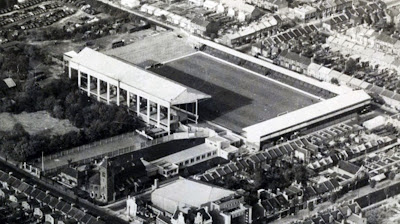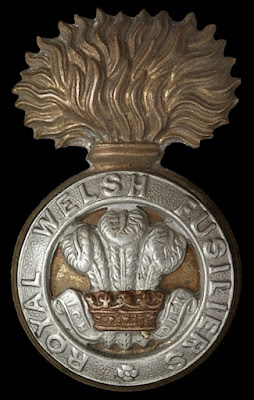Frank Burton: Footballer and War Hero | @RichEvansWriter
Footballers who also fought at war is always an intriguing topic, one @RichEvansWriter is passionate about. Take a look at the career of Frank Burton, a man who has an incredibly interesting story:
That travel was such a drawn-out process had two key effects: firstly, only the very rich tended to undertake it recreationally, and secondly, being abroad was an experience entirely removed from everyday living.
As an example, in 'As I walked out one Midsummer Morning', writer Laurie Lee recalls his younger self journeying through pre-Civil War Spain and remarks on the extent to which he was regarded as an alien figure. Lee, as his memoir explains, was merely passing through the country, but he was still there long enough to appreciate how it retained many of the rhythms of a previous age. The culture shock he felt, though, must have paled alongside the experiences of footballer Frank Burton. Preceding Lee’s Iberian visit by nearly a decade, Burton was no mere tourist – he was there to live and to work. It was just one chapter in a life replete with many fascinating twists and turns.
The 22-year-old Burton joined West Ham United in 1912 and made just over a hundred appearances for them either side of the First World War. Then, in 1921, he moved to Charlton Athletic, who he played for 97 times before moving to non-league Grays Thurrock United in a coaching capacity.
 |
| The Boleyn Ground where Frank Burton plied his trade for West Ham |
Tagged with the equine nickname ‘Bronco’ for his loping on-field gait, Burton could play in either of the full-back positions and was considered something of an exotic character. This may in some part have been due to a mistake he made on his 1911 census return; the player’s birthplace has frequently been cited as Luapanso or Luapagno in Mexico - rather than Cheadle in Cheshire - as a result.
Burton’s war record is particularly notable: while most of his fellow professionals joined the ranks between 1914 and 1918 - with many of enlisting in the Football Battalion - few of them were presented with both the Croix de Guerre (awarded by France to Allied soldiers mentioned in dispatches) and the Médaille Militaire (awarded for acts of bravery).
Burton’s war record is particularly notable: while most of his fellow professionals joined the ranks between 1914 and 1918 - with many of enlisting in the Football Battalion - few of them were presented with both the Croix de Guerre (awarded by France to Allied soldiers mentioned in dispatches) and the Médaille Militaire (awarded for acts of bravery).
Burton’s official War record in the Royal Fusiliers details him fighting at Ypres, Cambrai and the Battle of the Somme. He is known to have sustained half a dozen injuries in combat, and had to be treated for shrapnel wounds at the Welsh Metropolitan Hospital in Whitchurch, Cardiff on one occasion. However, in spite of all this, he still managed to represent West Ham in the London Combination (inaugurated as a League in 1915) 22 times between 1915 and 1918. While details of his injuries are hazy, the fact that he was removed from the front long enough to make such sporting appearances, suggests that they were nothing to be sniffed at. By extension, the fact that he elected to play while carrying said injuries, surely speaks volumes of his footballing resolve.
 |
| The badge of the Royal Welsh Fusiliers |
So, to Spain – Oviedo, to be precise. Not to take anything away from the notion of Burton as a trailblazer, but it is important to mention that Real Oviedo was formed by returning youngsters who had studied in England. It should be noted that in accepting the position, Burton actually replaced a fellow Englishman – Fred Pentland – as coach. Pentland took the reins at the Asturias club between spells at Atlético Madrid, where he is credited with
introducing the short passing game that powered them to success in the 1923 Copa del Rey. Nevertheless, Burton taking charge at such a time was no mean feat and seems to suggest a significant strength of character and spirit for adventure if nothing else.
Furthermore, continuing the rigid training and fitness regime introduced by his predecessor, and extolling the virtues of one-touch football, Burton-era Oviedo played with tactics far ahead of their time. It seems fair to assert that both Burton and Pentland deserve recognition for instigating a style of football that would have far-reaching consequences in this part of the world in subsequent years.
 |
| An early Real Oviedo CF badge, their 1960s version |
As with so many players of his era, footballing records are – at times – a little sketchy. Also, while regimental records are generally intact, many more general First World War records were destroyed by fire in the Blitz. An incendiary bomb in 1940 decimated the War Records Office in Arnside Street and up to two thirds of the 6 and a half million documents relating to actions between 1914 and 1918 were lost, so piecing together histories leaves unavoidable gaps.
The wanderlust that the spell at Real Oviedo seems to hint at in Burton is further evidenced by the fact that his final resting place was on the other side of the world - in Aukland, New Zealand. For a character only really represented in grainy black and white photographs, he certainly seems to have lived a very colourful life.
©The Football History Boys, 2022
By Rich Evans, written for @TFHB.
(All pictures borrowed and not owned in any form by TFHB)





Comments